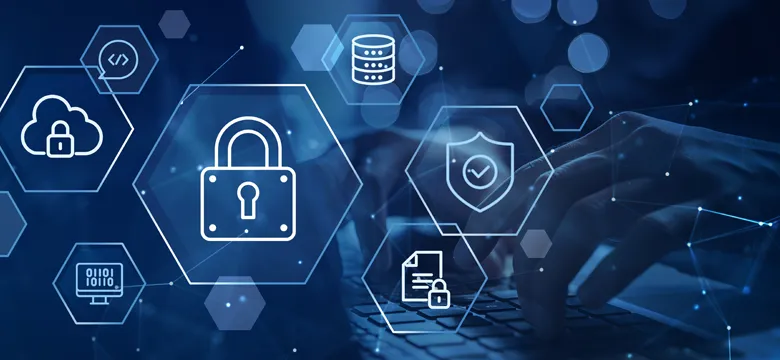
As the construction industry develops and changes, technology has become more vital in daily use, such as for record keeping and training of workers.
Construction companies find themselves becoming more and more reliant on software systems to keep up with the quickly advancing industry.
Mobile emails, digital tools, and smart devices are all often used to transfer valuable and sensitive data.
However, the more that technology becomes integrated with construction, the greater the risk of cyberattacks that could threaten a company’s business.

These cyberattacks come from a wide range of sources using a variety of methods, including:
- Ransomware: Locking a victim out of their data, using an encryption that requires a ransom to be paid.
- Malware: Malicious software that attacks devices, networks, and services.
- Phishing: Posing as a trustworthy source (via emails or texts) to gain sensitive information.
- Distributed denial of service (DDoS): Forcing a system to be unavailable by flooding it with data traffic.
- Social Engineering: Manipulating individuals into releasing sensitive information through social pressures.
According to Worldmetrics.org, “the construction industry faces 300% more cyberattacks than any other sector,” with over 70% of construction businesses experiencing cyberattacks in the last year alone.
To combat cybercriminals from holding a company hostage, modern technology can be used for defense and protection.
Implementing cybersecurity measures, such as multi-factor authentication, backing up data, and regular employee training, can all be extremely helpful in preventing a cyber incident.
Advanced technology, including hosted systems, can ensure secure data management and transfers.
Hosted services can help intercept security threats before they ever reach a company.
To stay safe and protect your construction company from serious financial damage, using cybersecurity technology is vital.
6 Critical Takeaways on Construction Cybersecurity
- Construction companies are attractive targets for cybersecurity threats, facing 300% more cyberattacks than other sectors due to frequent transfers of sensitive project data and historically low cybersecurity awareness and cyber risks.
- Common threats in construction cybersecurity include ransomware, malware, phishing, and social engineering, which can lead to severe consequences such as financial losses, project delays, and reputational damage.
- A proactive approach to cyber security risks is essential, including implementing a robust cyber incident response plan and educating employees about cybersecurity best practices to mitigate human error, often the weak link in security.
- Implementing multiple layers of protection to enhance security in construction, including antivirus software, multi-factor authentication, and regular data backups, can significantly reduce potential risks such as unauthorized access and security breaches.
- Hosted security solutions offer an additional layer of protection for construction companies, providing scalable, flexible, and cost-effective options that remote workers and on-site teams can easily access.
- Investing in modern cybersecurity technology and developing a comprehensive cybersecurity strategy is crucial for safeguarding sensitive project and company data, ultimately protecting the business from cyberattacks and maintaining client trust.
Why the Construction Industry Gets Targeted
Because of the unique structure of the construction industry, there is a high level of vulnerability to being targeted by cyberattacks.
Because technology evolves so quickly, many construction companies cannot keep up with it, with some just beginning to implement digital processes. Many companies still lack any cyber security measures at all.
Cybercriminals love to target the construction industry due to:
- The frequent transfer of sensitive information, such as blueprints, client, financial, and personal information, which can all be stolen or used as ransom.
- The unique structure of construction, with many remote workers (on site) and office locations, constantly communicating through digital networks and mobile devices such as emails and texts.
- Being an industry with a historically low perception of risk regarding cyber threats. Many contractors or workers underestimate how big of a target they are, leading to underinvestment in protective measures.
- The complexity of the construction industry, involving many different possible points of failure, such as subcontractors, suppliers, clients, and workers.
All these factors add up to a particularly enticing industry that is more vulnerable to cyberattacks. The outcomes of these attacks can also be extremely damaging to any business.
The Impact of Cyberattacks
If a construction company is targeted by cybercriminals, there can be significant negative impacts if their attacks are successful.
If data is lost or stolen, operations can be severely disrupted, leading to project delays. If cyber-attacks hijack a company’s system, the cost of downtime and recovery can make it very challenging to overcome.
Without sufficient cybersecurity, a company is also left vulnerable to serious financial losses, as cyberattacks can result in ransom payments, hefty recovery costs, and potential fines or legal fees.
Cyber-attackers frequently aim for financial data, such as employee payroll, project costs, revenue, and even client information. Any stolen financial data could result in fraudulent transactions, with the attackers making unauthorized transfers.
Building firms are particularly prone to falling victim to cyber fraud, with 5% being affected in 2022-23. Incidents like these can cause serious auditing challenges, causing steep costs and delays.
Finally, if a construction company falls victim to a cyber-attack, they can face serious reputational damage. Current clients may lose trust in the security of the company, as well as any future clients.
If a client’s data has been compromised, they may even pursue legal action against the company that failed to protect it under contractual obligations.
This makes having protective measures to prevent the possibility of a cyberattack extremely important, as without them, a company is at risk.
The Benefits of Modern Technology for Your Construction Business
All construction companies should make some investment into baseline cybersecurity, such as:
- Network firewalls
- Antivirus & Anti-Malware Software
- Data backups
- User authentication
- Spam filtering and email encryption
- Security awareness training
Modern technology offers far more cyber security options, even beyond these broad defensive measures.
With advanced security, a construction firm can not only stay protected against current cyber threats but also take proactive steps to prepare for future methods of attack. This includes developing an incident response plan to quickly address any potential breaches.
Along with the baseline security standards mentioned above, new technologies, such as artificial intelligence, can be utilized for real-time threat detection and response.
- AI has the ability to predict and analyze security threats, offering advanced solutions other companies may not have.
Using automation, processing, and maintaining security is simple and easy, keeping automatic updates ready to respond to any incident.
Multi-factor authentication (MFA) with biometrics can ensure that even if passwords are compromised, additional security layers, such as facial recognition or fingerprints, will prevent a cyberattack from being successful.
Data can also be encrypted and stored in secure systems that ensure protection even while being sent or transferred.
Data loss prevention (DLP) prevents the unauthorized sharing of any confidential information.
Recent research has found that advanced decryptioncan be used as a defensive measure against ransomware attacks, intercepting encryption keys to prevent them from holding the data hostage.
Many construction companies may also need cloud-based options, as their mobile workforce could face more digital vulnerability.
Employee training can also be automated and tracked, protecting the company through the first line of defense.
If companies are proactive with their approach to cybersecurity, such as investing in modern technology, the result will be a company protected and secure, building trust with clients and an edge over competitors.
Hosted vs. On-Premises Security Solutions
When it comes to implementing cybersecurity systems, contractors have two options for where they want those systems to be housed.
On-premises systems are installed and managed in-house, with the company being liable for all maintenance.
The benefits of having an on-prem security system include:
- Complete control and customization of the system.
- Keeps all data within the company’s premises.
- Reduced latency with no need to transfer data over the internet.
- It can be easily integrated with existing systems.
While on-premises security solutions can be useful for construction companies that need absolute control over their data, there are still some drawbacks.
On-premise systems can often be very expensive.
Often, with little flexibility, on-premise solutions cannot easily grow or change with a company, requiring highly skilled technicians to maintain it.
Additionally, on-prem options provide less availability for remote access, which may not be optimal for construction companies with a large on-site workforce.
Hosted security options, however, offer:
- Cloud-based services that can be accessed remotely through secure networks
- Managed by a third-party provider that covers all maintenance, often making the services much cheaper and hassle-free.
- Models of scalability to fit any type of construction company for their needs, with levels of subscription.
- Automated services that keep a company up to date without interruption.
- Disaster recovery plans ensure that in the event of an incident, all data can be quickly restored.
Hosted systems will most likely offer the best options for any construction company that needs to stay flexible with a shifting workforce or practice.
How Hosted Products Can Fit Your Construction Business
The first step in finding the right security product for any company is to evaluate their security needs.
Some construction businesses may not even need advanced tools or have the budget to afford them.
If a company already has an IT department, hosted systems could easily strengthen their existing defense measure.
Hosted products are scalable for a company’s needs or resources. Different subscription levels offer tailor-made options to fit a business structure.
Depending on the size of the construction company and the complexity of their work, broad-level security measures can immediately be implemented, and more advanced solutions can be added as needed.
Unlike on-prem systems, hosted providers ensure flexibility so that all workers can have easy access and continuous support.
Protect Your Company from Cyber Threats with FOUNDATION®
The construction industry is more susceptible to being targeted by cybercriminals because of its unique structure, lack of security, and desirable intellectual property.
Using deceitful methods of attack, such as phishing and ransomware, cyber-attackers will utilize any means to steal or hold valuable data hostage.
If contractors or construction businesses fall for these traps, the outcomes can be severe, such as financial loss, long project delays, and loss of client trust.
Thankfully, as cyberattacks evolve, so does defensive technology, which can be used to prevent and predict vicious online threats.
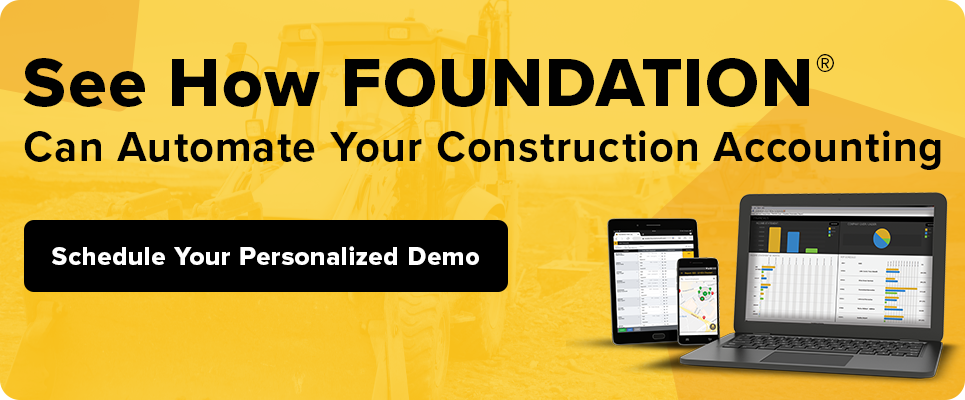
General cyber defense, including firewalls, backups, and worker training, can all make a large difference in protecting a company against cyber-attacks.
Advanced cyber security solutions, like hosted products, can keep construction companies even safer, with modern technology designed to defend against and predict cyber threats.
With FOUNDATION Hosted, cybersecurity has never been easier. With advanced defensive technology, we are ready to help protect your construction company against dangerous cyber threats.
Talk to a specialist to learn more today!
Share Article
Keep on current news in the construction industry. Subscribe to free eNews!
Our Top 3 YouTube Videos
Learn about our software more in depth with product overviews, demos, and much more!
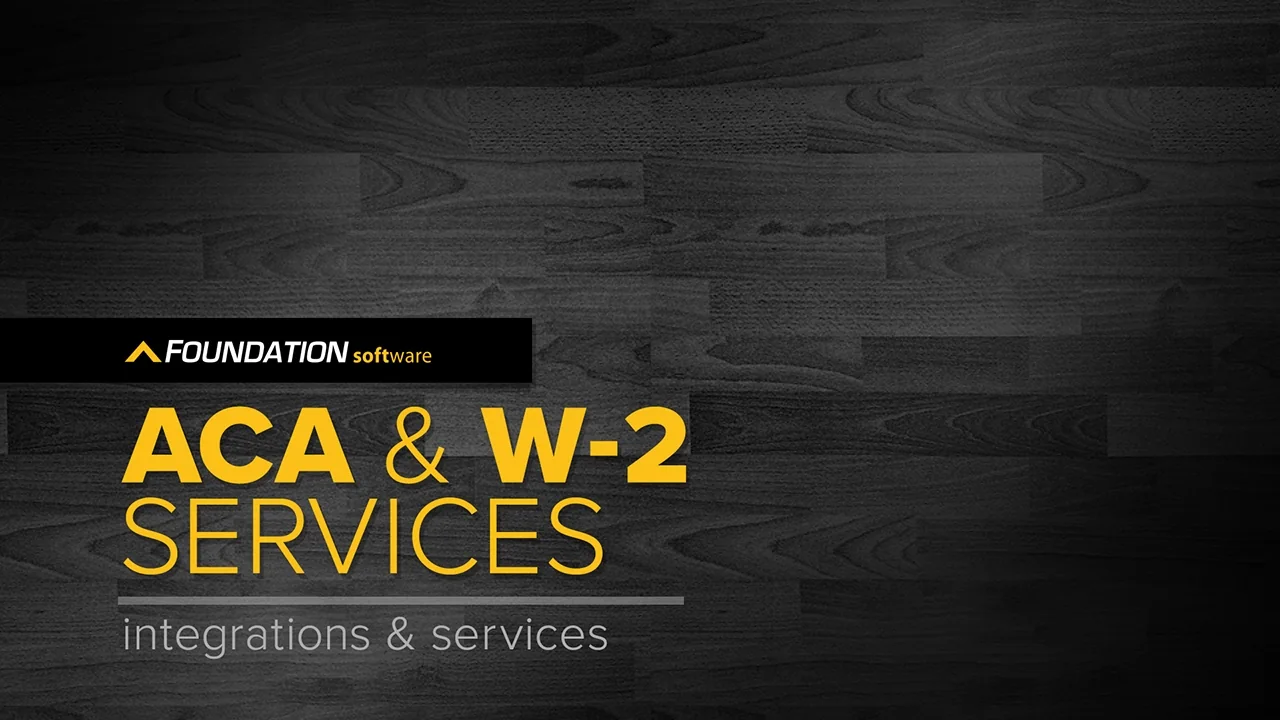
Our ACA reporting & e-filing services include official 1094-C and 1095-C IRS reporting, optional e-filing (no applying for a TCC code required), mailing to your employees and experienced support to help you.
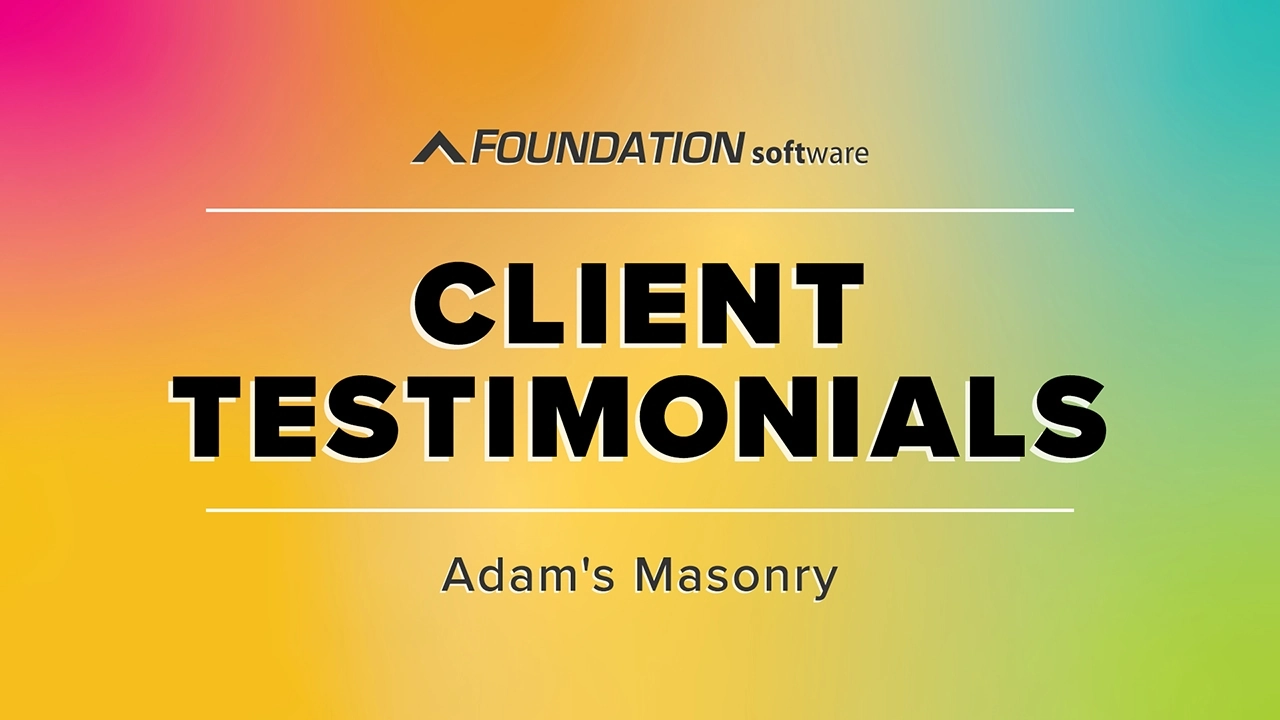
There are plenty of reasons to make FOUNDATION your choice for job cost accounting and construction management software — just ask our clients!
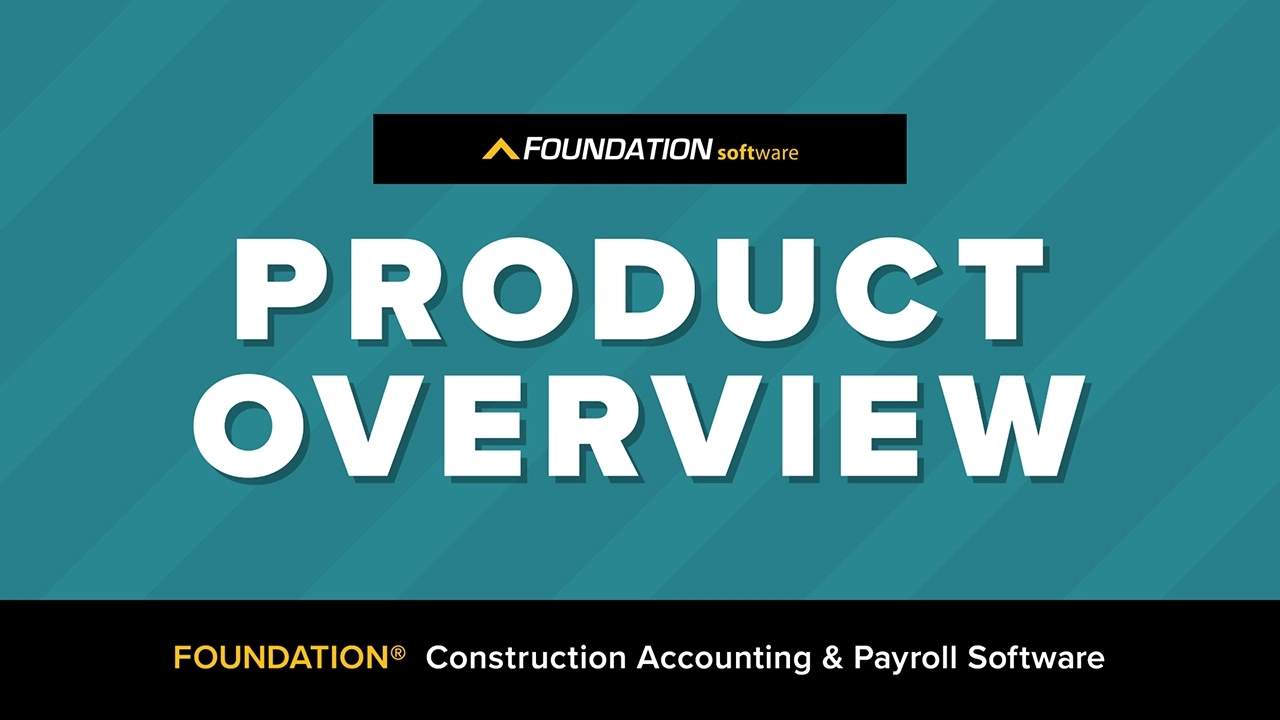
From job cost accounting software, to construction-specific payroll. Get an overview on your next all-in-one back-office solution.



